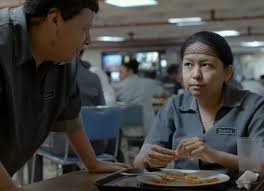140 films make up the films seen this year, (seven more than 2019) 35.5 of which (25.35%) by female directors. A big rise by 12% and a quarter of the catalogue!
The year featured films from or produced by: Argentina, Australia, Austria, Belgium, Brazil, Canada, Chile, China, Colombia, Czech Republic, Denmark, Estonia, Finland, France, Georgia, Germany, Greece, Hungary, Iceland, India, Iran, Ireland, Israel, Italy, Japan, Kenya, Lithuania, Luxembourg, Malaysia, Mexico, Mongolia, New Zealand,Norway, Poland, Romania, Russia, Senegal, South Africa, South Korea, Spain, Sweden, Switzerland, Taiwan, Thailand, United Kingdom, and USA.
USA, as ever, dominates production clear of France, now second and the United Kingdom. Germany is narrowly 4thagain ahead of Australia, Belgium and Canada.
Countries not represented this year include: Bosnia and Herzegovina, Bulgaria, Cambodia, Croatia, Cyprus, Cuba, Ecuador, Egypt, Holland, Indonesia, Jordan, Lebanon, Morocco, North Macedonia, Pakistan, Papua Niugini, Paraguay, Peru, Philippines, Portugal, Qatar, Saudi Arabia, Serbia, Slovakia, Slovenia, Trinidad and Tobago, Turkey, Ukraine, UAE, Uruguay, Vanuatu and Venezuela.
Award nominations are led by: A Hidden Life with 7, The Irishman, Once upon a Time in Hollywood and Waves with 6, The Man who Surprised Everyone and Parasite with 5 and 1917, And Then We Danced, Marriage Story and Sorry We Missed You with 4 nominations apiece.
Comments on films that didn’t make the cut yet deserve a mention:
Hustlers – J-Lo was larger than life but this fast out of the gate movie soon faded fast.
The Whistlers–Romanian thriller set on the whistling island of Gomera in the Canaries. Memorable in parts for the topic and scenery.
Knives Out – Slick comic whodunnit with great cast but underwhelms in the end.
The Farewell – interesting cross-cultural movie with US and China lacking some spice.
Bait – Very stylish B and W film from Britain. No giveaways and almost timeless in atmosphere.
Top End Wedding – Exuberant Aussie number recognizing the Aborigine culture
Un Rubio – Another sexually tense Marco Berger film in gloomy Buenos Aires. Has his own style.
Ride like a Girl – Bio of Michelle Payne, first female to win the Melbourne Cup. Honest stuff.
Sorry Angel – Gay French love story a la française.
The Unknown Girl – Solid Dardenne film but just not quite up there with their best despite Adele Haenel’s efforts.
In Fabric– Peter Strickland is one weird filmmaker and his latest is more memorable and more narratively coherent than others. Hard to know where to place him.
Greta – Neil Jordan writing and directing and Huppert acting couldn’t save this uninspiring and unpleasant number.
Le Jeune Ahmed – Les Dardennes attack racial crime stories with a difference here as they get behind the scenes of a young Muslim fanatic. Technically hard to fault but felt manipulative.
Bacurau– Brazilian fantasy film by the excellent Kleber Mendonça. Lots of good elements but just falls short overall.
Birds of Passage – Colombian blend of tribal customs and drugtrafficking. Ciro Guerra keeps us interested but not inspired. A bit sad really.,
De Stropers– Afrikaaner coming of age film. Solid in both story and technique.
Louder than Bombs – Norwegian directed but set in the US. All a little forced despite an excellent cast.
The Taste of Money – Korean film about a family twisted by money. Very elegant filming.
Late Night – Emma Thompson can do a lot but not save this bland egocentric US film.
Fete de Famille – Almost stereotypic French movie of the warring family having an idyllic summer lunch alfresco. Deneuve solid as always and Emmanuelle Bercot shines.
Tell it to the Bees – Bleak post WW2 British lesbian love affair in a small town. Carefully made, good acting but somehow it shrinks up in the end.
Summerland – similar topic as above, a decade earlier on the South Coast. Not a genre to inspire.
Deux Moi – I really liked this Parisian romantic comedy of near synchronicity.
The Last Note – noble Greek film about the worst Nazi atrocity in their country. Honestly made but hard-going
The Old Guard – Charlize Theron lifts an action movie that has many elements but little real innovation.
Atlantics– Great to see a contemporary film from Senegal that tackles issues like illegal migration and the role of women. Didn’t quite tough it out enough though.
Sobibor – Russian movie about a famous Nazi concentration camp and gas chambers. A bit filmed by the books in the end and you have to be in the mood.
Ad Astra – Brad Pitt goes beyond Mars in this movie. It’s good with great co-stars but never really blasts off.
End of the Century – Small elegant art house movie about two men meeting 20 years after a brief romance. Think Before Sunrise in Barcelona and you get the idea.
Queen of Hearts – Trine Dyrholm is fearless and very good in this taut Danish romance where the relationship between lawyer and schoolboy has devastating consequences.
Mouthpiece – Some raved about this Canadian film using two actresses to play two sides of the main character’s personality. It has its moments but for me the novelty wore off.
Herstory – Solid enough Korean depiction of the struggle of WW2 Korean comfort women to be recognized and compensated by the Japanese.
The Mongolian Connection – Nice to see a sort of Mongolian mafia/western. Low budget but good action scenes.
Cemetery of Splendour – Apichatpong’s latest from Thailand. Not for many as it’s sleepwalking theme and magic reality elements throw up interesting questions about our life in this and other dimensions, all in the context of a hospital in a steamy Thai river town. Different.
In the Aisles – Surprisingly astute sociological portrait of people working in a wholesale warehouse shop in what was East Germany. I liked it a lot.
24 Frames – Abbas Kiarostami’s last movie is definitely different with 24 frames that start as pictures and end up moving. Gets a bit much by half way through.







































































